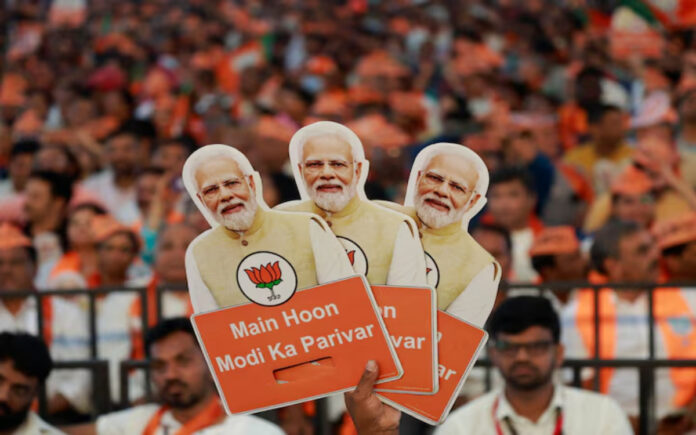New Delhi/Hyderabad: Indian Prime Minister Narendra Modi’s alliance is on track to significantly increase its parliamentary seats in the affluent southern region of the country, indicating a broadening of its appeal despite his decade-long tenure.
Results from the six-week national election, set to be announced on June 4, suggest that Modi’s Hindu-nationalist Bharatiya Janata Party (BJP)-led alliance will secure victory comfortably, as indicated by exit polls following the conclusion of voting on Saturday. If successful, Modi would become only the second Indian prime minister, after Jawaharlal Nehru, to secure three consecutive terms.
Initial concerns over low voter turnout at the beginning of the election in April had raised speculation that support for Modi might be diminishing. However, exit polls, while not always accurate in India’s vast and populous landscape, point to a different outcome.
Also Read | Modi 3.0 Crossroads: Revisiting BJP’s Promises Before Final Results
Traditionally perceived as reliant on the large northern states such as Uttar Pradesh and Bihar, the BJP is now making notable inroads in the more industrialized southern states. This shift is attributed to Modi’s personal popularity, substantial infrastructure investments, outreach to the Hindu majority — including the inauguration of a temple to Lord Ram on a contested site in January — and strategic alliances with influential regional parties.
According to ABP-Cvoter, Modi’s National Democratic Alliance (NDA) coalition is projected to secure 55 to 64 seats across the five southern states of Andhra Pradesh, Karnataka, Kerala, Tamil Nadu, and Telangana. This would nearly double the 32 seats it won in the 2019 election. Notably, despite not holding power in any of these states, the BJP is expected to win more than 30 seats on its own.
News18 forecasts the NDA securing 51 to 64 seats in the region, while Axis My India predicts 59 to 67 seats. Yashwant Deshmukh, founder of CVoter, anticipates significant gains for the BJP across all southern states, posing a substantial challenge to the ruling parties there and solidifying the BJP’s status as a pan-India party.
If the polls prove accurate, the BJP is poised to make historic breakthroughs, including potentially securing its first-ever seats in Kerala, a Communist stronghold. Analysts attribute this success to Modi’s widespread popularity and strategic appeals to various communities, including Hindus and Christians.
Also Read | OpenAI Exposes Covert Influence Operation Targeting India’s BJP
While the main opposition Congress party dismisses the exit polls, claiming their “INDIA” alliance will secure a clear majority, analysts warn that BJP gains in the south could pose a direct threat to Congress’s dominance in the region.
Ghanta Chakrapani, a political analyst, underscores the BJP’s effective candidate selection strategy, focusing on individuals with strong local presence and support from influential caste or community groups.



